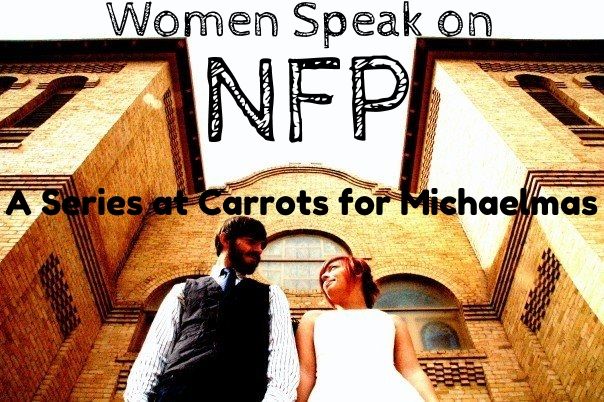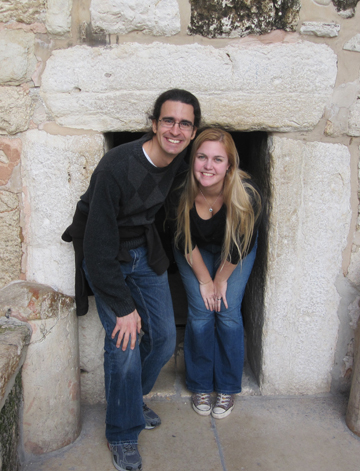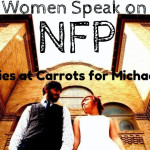
This is a guest post by Jessa of Shalom Sweet Home in the Women Speak on NFP series. In this series you will hear from women (some Catholic, some Protestant) using various methods of NFP, some to avoid pregnancy, some trying to conceive, and their experiences.
Disclaimer: This series is not meant to be a substitute for any method of training in NFP! If you are interested in one of the methods introduced in this series, please contact a certified instructor for information about training in that method of NFP.
So you are an NFP-practicing Catholic. Congratulations.
Beep. Beep. Beep.
You’re off on a girls’ weekend and everyone had a late night, but you have to wake up at 8am to take your temperature and then have to explain why.
Congratulations, all your friends think you’re nuts.
And then it’s the bachelorette party of a dear friend you met at the University Catholic Center, and you, married without children, are sitting in a bar with one very pregnant friend and another postpartum breastfeeding friend, nonchalantly shouting about cervical mucus with the newly charting fiance over the din of the karaoke. Congratulations. If anyone can hear you, they are really grossed out and they also think you’re nuts.
And if you come from a Protestant background, congratulations. Even your own well-meaning relatives, who won’t stop calling it the rhythm method, think you are totally nuts.
But if you really want to have some fun, move to a country where the vast majority of people have never even met a Christian, let alone a Catholic. Say, Israel.
You will find yourself at the gynecologist’s office for a routine visit, and your feet will be in the stirrups when your Jewish doctor adjusts his yarmulke and launches into a complicated theological argument about how using NFP to avoid pregnancy is no different than using artificial contraception to avoid pregnancy. Even if you live in the U.S., a country that prides itself on plurality and freedom of religion and conscience, many doctors will also think that you are nuts.
All this has happened to me. I am Jessa, an American Protestant-to-Catholic convert, and for four years I have been married to Rodolfo, a six-foot-three Ecuadorean astrophysicist and wonderful man of God. We live together in Jerusalem because of his work, and because of a variety of complicated reasons and an ongoing process of discernment of God’s will for our family, we do not have any children… yet. We practice the Sympto-Thermal method of Natural Family Planning taught by the Couple to Couple League and helpfully discussed in detail in Deirdre’s post earlier in this series.
And all our friends, aside from the ones who would be shouting about cervical mucus above the karaoke with me, think we’re nuts.
But let’s go back for a second to that gynecologist’s office. It may help to know that most Israelis are extremely frank and forward and definitely wouldn’t think twice about starting an argument just because one of you has just dropped trou.
It may also be helpful to know that Jewish law also has certain very specific rules regarding procreation and contraception, including prohibitions on having marital relations during menstruation and the days immediately following it, because of ritual uncleanliness, and on using barrier methods of contraception, because of the Old Testament prohibition against “spilling the seed” (Genesis 38:9-10). The vast majority of Orthodox Jewish women will use birth control pills for the first year of their marriage, and then promptly go on to have as many children as they can, fulfilling the biblical imperative to go forth and multiply (Genesis 9:7) and the “mitzvah,” or joint commandment and blessing, of increasing the number of Jewish people in the world.
So, to a Jewish person, a Catholic woman who celebrates sex at the infertile time at start of her cycle as a great way to strengthen the marriage bond is, perhaps understandably, completely nuts. (Or, as one would say in Yiddish, completely meshuggah.)
But the Jewish concept of a “mitzvah,” or joint commandment and blessing, is a great way to look at the Catholic Church’s mandate on couples and contraception: it is at once a commandment and a blessing. Setting aside all the usual, valid and important arguments that NFP is better than contraception for your marriage, for your health, for your body, for the environment and for society as a whole, NFP is also infinitely better for your relationship with God as a married couple.
Using NFP to postpone pregnancy still leaves you open to the possibility of life. It is a different worldview that acknowledges and trusts God, not yourself, as the master of your family’s destiny, putting your trust in God while still leaving room for free will and responsibility. It requires discipline, sacrifice and self-control, the same discipline, sacrifice and self-control required to restrict sexual relations to within the context of marriage, both before and during life as a married couple.
(We should also be mindful of our words and aware of the difference between using NFP to “avoid” pregnancy and using NFP to “postpone” pregnancy. I’ve seen confusion of these terms even among well-meaning good Catholics, including readers and contributors on this very blog. Even if you have never used anything but NFP in your married life, if you are using it to avoid pregnancy, rather than postpone it, you are not following the church’s teaching. You may be following the letter of the law, but not the spirit of the law.)
To be honest, I don’t think I handled the Israeli doctor’s arguments and questions all that well. As the kind of person who usually just tries to get the heck out of the gynecologist’s office as fast as possible, I didn’t have the presence of mind to think on my feet (or on my back, as it were) and give a good answer as to why NFP is not just another form of birth control. I have a good answer now.
The difference is a difference of intention. As Theology of the Body expert Christopher West has pointed out, the difference between using NFP to postpone pregnancy, while being open to God’s will for your life and your family, and using birth control or sterilization to avoid it is, essentially, the difference between being non-procreative and being anti-procreative.
West writes in Good News About Sex and Marriage: “Suppose there were a religious person, a nonreligious person, and an antireligious person walking past a church. What might each do? Let’s say the religious person goes inside and prays, the nonreligious person walks by and does nothing, and the antireligious person goes inside the church and desecrates it. (I’m framing an analogy, of course, but these are reasonable behaviors to expect.) Which of these three persons did something that is always, under every circumstance, wrong?¬†The last, of course. Husbands and wives are called to be procreative. If they have a good reason to avoid pregnancy, they are free to be non-procreative. But it’s a contradiction of the deepest essence of the sacrament of marriage to be anti-procreative.”
Here is another way to think about it: some people wear fur coats. Some people don’t agree with wearing fur coats, but there is a big difference between simply not wearing a fur coat yourself and actively throwing red paint on someone who does.
The female half of every married couple, in her naturally occurring state, has a time when she is fertile, a time when the couple is procreative. She also has a naturally occurring time when she is not fertile, when the couple is passively non-procreative, simply because of the workings of nature and the miracle of Creation. But if a couple is using contraception, they are actively working to be anti-procreative. Some types of contraception literally work to make one’s body anti-procreative by suppressing ovulation, thickening cervical mucus and discouraging implantation.
God created all life to be cyclical, to have natural seasons, with ebbs and flows. The time for weeping, the time for laughing, the time for mourning and the time for dancing mentioned in Ecclesiastes 3 applies to all areas of life, including fertility. In God’s infinite wisdom, He created women with a built-in cycle. A time for fertility, and a time for infertility. Knowing your body (or your wife’s body), being aware of the blessing of the monthly seasons that God has given you, and working together with the natural cycle of things is completely different from working against your body with artificial hormones or copper or rubber. There is a time to enjoy the marital embrace for the companionship and the strength it brings to your marriage, and there is a time to enjoy it with the added joint commandment and blessing of creating human life with the help of Him who created all of us.
Jessa Barniol is the only blonde and the only American living in her Jerusalem apartment building, where she loves to garden (on the third floor), send snail mail, and drink tea from all over the world. She loves her Ecuadorean husband, bright colors and beautiful fonts (she daylights as a graphic designer), and the Catholic faith, which she converted to in college. She blogs about her adventures in the Holy Land, a magical place where prophets have walked, the books open backward, and everything floats, over at Shalom Sweet Home.



Great post Jessa! I have had to explain NFP so many times….maybe I will just keep a link to this instead! 🙂
Thank you, Alicia! I was also trying to work this tidbit in there somewhere: at my work, they have this pastel-colored toilet paper that is really common in Israel but really not helpful for observing, um, physical signs. 🙂 There are some things that only NFP gals understand!
I enjoyed your article, but I have a question…am I not following Church teaching because I am using NFP to avoid a pregnancy? If I got pregnant today, I would be 49 years old when my baby would be born, and my husband would be 58. Is it wrong for us to be avoiding pregnancy?
Hi Karen! Thanks so much for your question. The Church teaches that couples are to be open to life while being responsible at the same time. Couples are allowed and encouraged to avoid/postpone pregnancy for “just reasons” that are “not motivated by selfishness.” The interpretation of that changes from couple to couple, and considerations of age are definite candidates for “just reasons.” The trick is to approach it with continuous prayer and openness to God’s will. Consider this: If God were to surprise you with a pregnancy at this stage of your life, what would you do? If you would accept the child with open arms and submission to the will of God, whether or not you planned it, then you are probably in line with church teaching. If you would panic, get angry with God or even (worst case scenario) consider or get an abortion, then you might need to rethink your intentions.
The other main factor is that it must be an ongoing process of discernment. The door must always remain open, whether or not you choose to walk through it. If God suddenly calls you and your husband to be late-in-life parents, in spite of what society tells you, you must be willing to answer the call. To me, “avoiding” means closing the door and never looking at it again. “Postponing” means the door is open, you are just not walking through it now. And perhaps you may never walk through it (it is definitely possible to “postpone indefinitely” for a continuous “just reason,” such as age or serious health risks), but you leave it open just in case God decides to pull you through it at some point. That is the difference. It’s a subtle difference, but an important one.
I hope this clears up your question a little bit, but please feel free to email me at shalomsweethome@gmail.com if you want to keep discussing. I also highly recommend you talk with your priest or spiritual director if you have more questions about your decision.
And here is the section of the Catechism for your reference:
For just reasons, spouses may wish to space the births of their children. It is their duty to make certain that their desire is not motivated by selfishness but is in conformity with the generosity appropriate to responsible parenthood. Moreover, they should conform their behavior to the objective criteria of morality. (CCC 2368)
Praying for you! 🙂
I have really been enjoying these posts on NFP. I am not catholic, but I don’ t believe in messing with my hormones, so I use the method described in “taking charge of your fertility”, which I learned about at my liberal arts college, and I love it! Once I got used to it, it’s been very empowering to understand how my body works, and when we were ready to conceive it was easy to plan and we conceived within 2 months of trying!
Hi Sarah! That’s wonderful! (And congrats on the kiddo!) I actually think that more people, Catholic or not, would be open to using NFP if they just knew a little more about it and about what they’re actually putting in their bodies. I really like one of the buttons from iuseNFP.com that says, “Because wouldn’t I look silly buying hormone-free chicken if I didn’t?” In addition to all the other great reasons, NFP is cheap, organic and healthy. Thank you for being open to embracing such a counter-cultural idea! 🙂
{Kathy} You did a beautiful job explaining the advantages and nuances of NFP. Thank you for keeping your light open for all to see!
Thank you so much, Kathy! I really appreciate the encouragement! 🙂
Wonderful post. This is the first time our Catholic phrase “open to life” was explained in a way I could actually understand.
Thank you so much, Kate! So glad this post helped you! We do throw around these terms a lot, but it’s a good idea to step back and think about what we’re really saying. The Catholic Church is not just a Sunday-morning thing; it is a whole worldview and lifestyle. And being “open to life” is about a lot of things, not just about giving up society’s contraceptive mentality. I really love (the amazing and entertaining) Simcha Fisher’s suggestions in this article, particularly #7. Go forth in peace, to love and serve the Lord! 🙂
I really appreciate your perspective in this matter, very well said my dear. 🙂
Thank you so much, Lindsay! God bless you! 🙂
I’ve been following this series and while I have enjoyed things about all of the posts, I especially loved this one! I remember being grateful that when we all went out for my Bachelorette party and stayed at our friend’s house I was able to share a room and bed with one of my sisters – so when I took my temperature at 7am I didn’t have to explain what I was doing. 😛 Thanks for sharing all of your experiences and explaining our Catholic teachings so well!
Beautiful! Thank you so much for your witness and words!!
I have found “couple fertility” to be more accurate and helpful than speaking of her fertility. Since we need an egg, mucus, and sperm, “couple fertility” makes sense. As well, the phrase rightly forms attitudes toward partnership. I see women feeling responsible for long periods of abstinence during tough cycles, but he’s fertile 24/7- she is the only reason there is an infertile time at all.
Thank you again- I love your examples . It is so hard to describe the mystical and the beautiful, and you have done a lovely job of it.